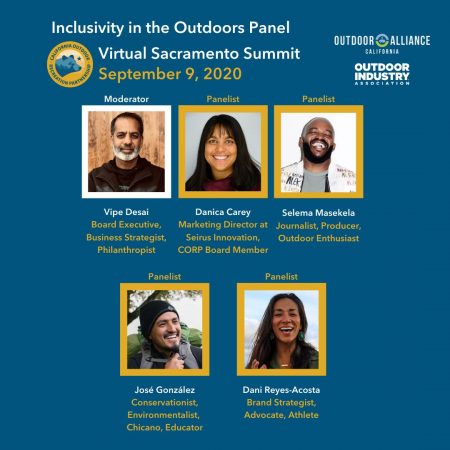On September 9, I was invited to moderate an expert panel about diverse representation in the outdoors. As a part of the annual Sacramento Summit, the panel was titled “Inclusivity in the Outdoors.”
Hosted by the California Outdoor Recreation Partnership, and sponsored by the Outdoor Industry Association and the Outdoor Alliance California, 150 outdoor recreation enthusiasts participated in the Sacramento Summit 2020 virtually and learned about topics related to equitable access, environmental justice, climate resilience, and so much more.
I was joined by several Justice, Equity, Diversity, and Inclusion (JEDI) experts and advocates on the panel, which included Selema Masekela, action sports commentator, journalist, and former host of ESPN’s X Games; Danica Carey, director of Marketing Operations at Seirus Innovation; Dani Reyes-Acosta, athlete and digital strategist; and Jose González, Founder of Latino Outdoors.

I framed the premise of our talk on 2020 being the year for a “great reset.” Not only are we dealing with a global pandemic and an economic collapse comparable to the Great Depression, but we’re also sitting in the middle of the biggest civil rights movement of our lifetime. While each event is cataclysmic in its own right, the accumulation of all three incidents has outlined an opportunity to reset policy, breakthrough long-standing stigmas, and re-structure societal norms for a more equitable nation.
The Importance of Dialogue
Towards the beginning of the panel, I mentioned that the discussion around JEDI isn’t new, but it has definitely changed. I wanted to hear from the panelists: “What has changed? Are we seeing action or is this just still talk?”
Danica’s response hit the nail on the head: “Any action starts with initiation.” She discussed that hard conversations are the first step. Witnessing allies and advocates who are well-positioned to speak up is powerful. As she put it, “There are so many people willing to champion inclusivity in the outdoors, and many are willing to take leaps and risks…conversations are the catalyst for action.”
Selema, too, made a great point about dialogue. He said he’d personally noticed that people have decided to “pause and listen” to issues around diversity and equity, truly inquiring about the best ways to respond, instead of reacting. His perspective considered how pausing to respond includes “dialogue, discussion, [and] planning.” It means being prepared to say “if we get it wrong, we’re still willing to stay in the work so that we can get it right.”
Branding and the Evolution of Inclusion
Before the panel started, I knew that an important topic to cover would be branding and business strategy. For outdoor enthusiasts, activity and participation is a lifestyle. We rely on certain products and gear to help us achieve our goals in the outdoors; recreation and product go hand-in-hand. I asked a few panelists to discuss why diverse representation in branding is imperative in 2020.
Dani’s viewpoint as an expert strategist informed us that brand representation is constantly evolving. “Tokenism [in the outdoor industry] is historic, so how do we look at inclusive brands and consumer buying journeys now? It starts with awareness.” For Dani, brands should operate under the truth that “diversity is our destiny.”
We also discussed real-life examples of brand inclusivity. Danica responded that not only is brand representation important from the business-owner side, but also from the consumer side. Businesses need to know what’s important to their key audiences. She pointed out a great example of a smaller brand that has embraced equitable access: Scarpa. To Danica, the truth for consumers is that “we lead where businesses go.” She mentioned a few other examples of brands showing up with inclusivity, like Osprey, Brown Girls Climb, and Brown Folks Fishing.
Policy and Law in Outdoor Recreation
Another key theme we discussed is diverse representation from a policy and law standpoint, and I was eager to hear from Jose on this topic. While he covered so much in his response, one thing he said that stuck with me is how conversations in the policy space are “shifting from diversity to justice.” This type of re-framing is “necessary because the demographics of 2050 are not going to be the same as the demographics of 1950. We need to consider implications from policy like who’s voting, who’s spending, and who’s buying. Diversity can be an invitation to innovate.”
Moreover, he mentioned that diverse voices in boardrooms are crucial. He suggested that business-owners and policy-makers invite diverse groups into decision-making meetings, and also specifically ask diverse groups to co-create policy. Lived experience can be a basis for strategy.
Editor’s Note: If you’d like to learn more about diverse representation in the outdoors, watch the full Inclusivity in the Outdoors session. Organizations, businesses, and individual outdoor enthusiasts alike will gain insight into actionable steps and suggestions on how to advocate for JEDI in the outdoors. And be sure to check out the other panels and discussions held at the annual Sacramento Summit 2020.

